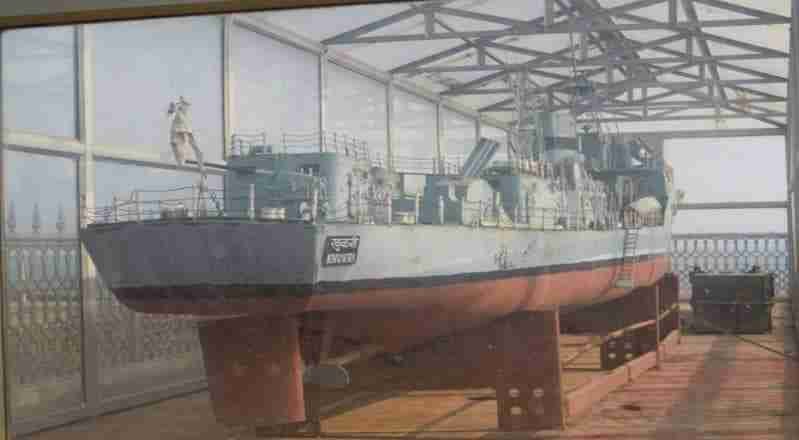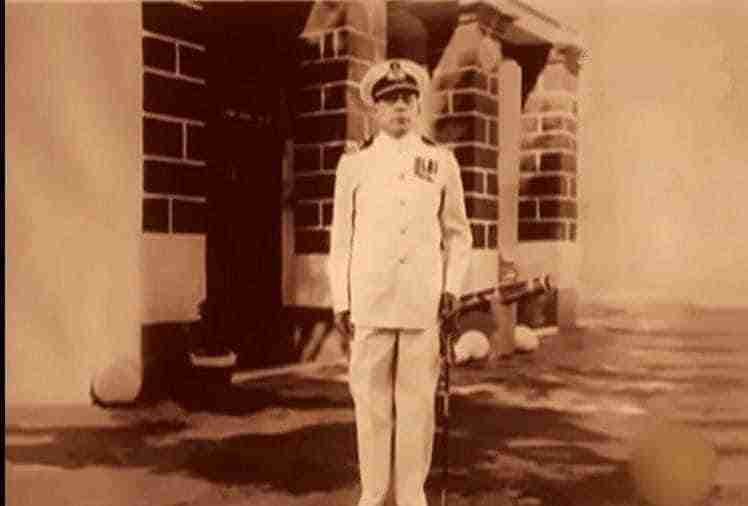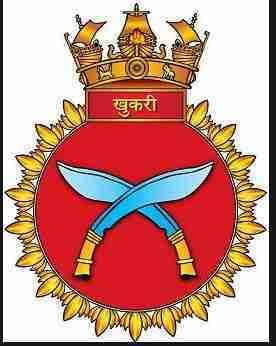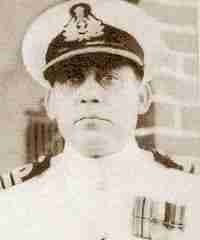When his ship (INS Khukri) was torpedoed by a Pakistani submarine, during the 1971 Indo-Pak War, Captain Mahendra Nath Mulla, MVC, chose to go down with his ship. An an act of valour in the best traditions of the Indian Navy. Perhaps there is no better way to explain the ethos that a serviceman lives and dies by than by relating his story .
Below is an article written by his daughter, Ameeta Mulla Wattal, wondering why he chose to go down with the ship.Some years later, another Naval officer wrote a letter to her, explaining in words, an eternal truth: the sacredness of the bond between an officer in the Armed Forces and the men under his command. Both the article and the letter make one understand the psyche of a warrior and the bonds that tie men in battle.
The dark night of December 9, 1971, is imprinted on my mind like a scar. Thirty- nine years ago during India’s war with Pakistan, two vintage anti-submarine frigates that my father, the late Captain Mahender Nath Mulla commanded, were ordered to hunt and destroy a Pakistani submarine lurking off the coast of Diu. The operation was doomed from the beginning. Like in Tennyson’s poem “The Charge of the Light Brigade,” the brave men went into the night as commanded.
A Captain and my father
One of the two frigates was torpedoed by the modern Pakistani submarine, the PNS Hangor. the INS Khukri sank, taking 178 Indian naval ratings and 18 officers including my father to their watery graves. it was reported that the captain of the ship showed extraordinary courage during those last minutes of his life, helping save as many of his men as he could and not abandoning his vessel. He went down with his ship, along with the other brave soldiers. A Mahavir Chakra was awarded to him posthumously.

I have often wondered what made my father decide to go down with his ship. Was it a quest for immortality beyond death? Or was it an old naval tradition? or did he make the choice because he felt it was the right thing to do? My sister and I had come home on vacation before the war. the anti-aircraft guns that lit up the night of December 5 in Bombay were, for us, a display of fireworks. War and death were just fast- moving images of action movies seen in the security of the United Services Club from where we could make an exit.
This innocence was torn apart on that December night. the torpedo that struck INS Khukri was not the screenplay of a film. This real-life battle had no exits. The news of the sinking of the Khukri was brought home to my mother along with weak assurances that the Captain of the ship had been rescued. I recall that my mother felt a hopeless despair because she knew that her husband would not put his own safety before the safety of his men.
The sinking of the INS Khukri was my leitmotif and I never transcended the ideals that my father lived and died for. I remember him telling me: “Never call your best action a sacrifice. If one fights for a cause, it is because one cannot live with the way things are”.
The period immediately after the war was marked by euphoria and Indians drank, in the words of Ramachandra Guha, “the elixir of victory”. The loss of a ship was collateral damage in the theatre of war: An awkwardevent, perhaps best forgotten, especially because the larger war had been won. With the passage of time my mother became involved with the widows of the sailors. The INS Khukri story repeats itself in different ways. It is the grand narrative of national success and the achievements of a few that frequently submerge the narratives of small folk who live their lives battling unknown enemies and are often deprived of little compensations.
Why is it that the voices of widows and mothers of the “shahids” of Kargil or Kashmir remain submerged like that ill- fated frigate? Has our moral space become so limited that those who have been elected or selected to serve this nation have no need for ethical barometers? What a cruel joke it is when these protectors create an “Adarsh” (ideal) housing society on the foundations of a Khukri Park.
INS Khukri and my leitmotif
My battle for life commenced after the 1971 War. The sinking of the INS Khukri was my leitmotif and I never transcended the ideals that my father lived and died for. I remember him telling me: “Never call your best action a sacrifice. If one fights for a cause, it is because one cannot live with the way things are”.

His sacrifice influenced me to be a teacher. It is a choice I have never regretted. On that fateful night, he helped as many sailors he could to the safety of lifeboats. When he had done his duty he took his decision to go down with his ship. I suppose he saw himself as the ship’s master, nurtured by his ideals. He made the choice not because it was the right thing to do, nor because it was expected of him, but because knowing him as I did, it was the only thing he would do. He was the first Captain of independent India’s Navy to go down with his ship and hopefully the last.
One such man is enough to bring honour to an entire nation for a lifetime.
–Ameeta Mulla Wattal is Principal of Springdales School, Pusa Road, New Delhi and the daughter of the late Captain Mahender Nath Mulla, MVC.
A letter and some blessings
Words can often be a balm. This letter by email from Capt (IN) Allan Rodrigues (Retd) , definitely was. Here is what it said:
Dear Ameeta Mulla Wattal,
I am an ex- Indian naval officer who left the service honourably in 1994. I live in New Zealand, and work in Australia and New Zealand these days.This email refers to an article you wrote some five years ago very poignantly, on your father the Late Captain Mulla, pondering why he chose to go down with his ship.The article obviously struck a chord with many of your readers, and in the way of the internet, travelled the world before it entered my mail box a few days ago, via a social network maintained by the 42nd NDA and 51st IMA course.
I did not know your father personally, but I feel I have always known him and for what he stood for, all of my adult life. I missed the fighting in 1971 as I was cadet in the NDA at the time, and only passed out and joined a warship at sea in June 1972, six months after the war ended.
In the event I became an Anti Submarine specialist and along the way, I ended up commanding three warships including INS Himgiri (also an anti submarine frigate, although a more modernised version of the original Khukri). I retired after 20 years, joined industry, and eventually moved across the Pacific and the Tasman Sea to New Zealand.

I only say this because it has some context to the comments I make below, on the decision by your father to go down with his ship. In doing so I hope to capture the circumstances (and, perhaps, the greater purpose) of why captains of warships in extreme circumstances, take such drastic actions that seem to lack purpose or reason (particularly to the public at large).
I’m sure many naval officers of senior rank and certainly more qualified than me, may well have commented at length after reading your article.I just felt I might throw some light on a take that has largely been neglected. I know the pain never goes away and I apologise for any anguish I might give you in the process, but I do believe that Captain Mulla did something for the service that night, that has not been either understood or recognised, by both the navy, and the public at large.
The Indian Navy of 1971 was a different beast from the one we have today. Little was known about Anti- submarine warfare (ASW) at the time. We commissioned our first submarine in 1968 in the then Soviet Union, and had barely begun operating a fledgling submarine arm by 1970. Pakistan by contrast, had been operating submarines since the early sixties. Ships like the Khukri and Kirpan supposedly specialised in ASW, formed the vanguard in the fight against Pakistani submarines. They had little in the way of operational experience against submarines, and even less knowledge about the ocean environment.

The physics of detection can be explained in simple non-technical terms – the ‘Khukri’ had sonar; which was the best we had at the time. It had a maximum range (in laboratory conditions) of only 1500 yards. We knew little about the harsh nature of the environment underwater. The seas in the tropical waters off India’s coastline are heated up in the morning and afternoons, raising surface temperatures to ambient levels. The worst effect is in the afternoons.
The laws of physics then apply. They literally bend the sonar waves downwards, severely limiting detection range. Since deeper waters are ice cold, there is meeting point of the warm waters on the top and the cold waters below.
This meeting point is called the layer; where the sonar beam bounces off and is almost totally reflected upwards. There is very little penetration below the layer. These layers lie between 30 and 60 metres depth in tropical waters, and are exploited by expert submariners who are able to hide under it.
It took us another 15 years after the war, all which I was professionally involved with in one way or then other, to fully understand the nature of anti-submarine warfare, and to learn how to work with the physical limitations imposed by a hostile ocean underwater environment.
Submarines, on the other hand, are not as handicapped, as they do not need to transmit on their sonars to detect a ship. Their engines are silent. They can consequently listen out for a warship and even identify a type of ship and its signature from the sound of its engines. Skilled submariners hide beneath the layer and approach with stealth. They only transmit at the last possible moment when they need a final range to fire their torpedoes.
Warships at sea in 1971 (and Captain Mulla in particular) would have been more than aware of these limitations.
They would have known two simple facts
(a) That a submarine at sea would have already detected a surface ship long before the ship had even reached any kind of detection range;
(b) That even if the warship did detect the submarine, it would be at the penultimate moment, when the submarine had already fired, (or was on the verge of firing) its torpedoes, giving the warship a few minutes at best, to take avoiding action, let alone counterattack.
The Pak submarine that sank the Khukri used its environment to maximum advantage. In hindsight and over the years, we developed better sonars and better tactics. We employed dedicated ASW aircraft with sonobuoys and magnetic detectors, helicopters with dunking sonars, and yes we spent a lot of time learning the harsh facts of the ocean environment we were forced to operate in.
This is the context in which ships put to sea in 1971, against an adversary who was well-versed in using submarines to maximum advantage. Our own ASW ships had little in the way of riposte or as much experience we would have liked to have had before the war of fighting submarines.
In the event every sailor at sea recognises a moment of truth, when all of his training and skills are put to the ultimate test. It is the moment when the ship beats “to quarters” and goes into action against an enemy in sight, or an enemy that has been detected.
INS Khukri and Kirpan were operating in submarine infested waters. The ship would have gone to “action stations” against a submarine many times over, in the days and nights preceding the sinking of the Khukri, sometimes for genuine reasons, sometimes for false alarms. All of this would have exhausted the crew and formed the fog of war; that hindsight experts, armchair generals/ admirals and the public at large never quite get.
Each time the crew of the INS Khukri beat to quarters and battened down for action, a clarion call would have been broadcast on its tannoy; Hands to action stations… assume first-degree anti- submarine readiness; assume damage control state one condition ‘Zulu’.
The crew of the INS Khukri would have known full well, that they were going against a committed enemy, and that the dice were loaded against them. Each of them would have been wondering whether they were going to come out of the action alive or dead. This is an age-old fear that men have, and then learn to conquer, when they go to sea and to war. It is the nature of the beast. The army and the air force face similar issues, which they deal with in their own inimitable way.
The people most at risk on board the INS Khukri that night would have been its technical departments; engineering and electrical officers and sailors, closed up at action stations in the bowels of the ship three and four decks below the waterline, keeping the engines and the machinery running, so that their captain could fight.
It takes a special kind of motivation to get these men to go down into the bowels of a fighting ship whilst in action against a submarine. They do so each time out of a sense of duty that the ship cannot fight without them and mostly because they recognise that one single unspoken truth: That, their captain will not forsake them; that their captain will not leave them behind.
Each of them knew if a torpedo were to hit, it would do so well above where they were located, and that the chances of them surviving would be a lot less than those sailors who were fortunate to be located on the upper decks, and above the waterline.
It takes a special kind of motivation to get these men to go down into the bowels of a fighting ship whilst in action against a submarine. They do so each time out of a sense of duty that the ship cannot fight without them and mostly because they recognise that one single unspoken truth: That, their captain will not forsake them; that their captain will not leave them behind.
That is the crux of the why, and the reason why Captains at sea honour this unspoken agreement. Captain Mulla would have known that many of his boys were trapped (but yet alive) in the bowels of his ship when it went down, in the few minutes after the torpedoes hit. He tried to help as many as he could, but I suspect he could not bring himself to save himself, whilst his boys were dying down below.
That he chose to go down is a personal decision, perhaps even a moral decision; but it was a decision that set a standard that will save lives in future actions. It forced all of us who came after him, and who were privileged to command men in peace and war, to recognise that undeniable and unspoken bond between fighting men; that you fight your ship against an enemy (or the ocean in a storm), with what you have, and to the best of your ability, and that come what may, you never forsake your troops or leave a man under your command, behind you.
What Captain Mulla did that fateful day has had an enormous and positive impact on the service he loved and on the men who continue to serve it to this day. It reminds every one of us chosen to command of the qualities of leadership needed under duress, and of the ultimate responsibility we have to the families of the men we command: You never forsake your men; You never leave a man behind.
I know that this hardly helps when trying to explain all of this to the family of a Captain who makes the ultimate sacrifice. Nor does it assuage the grief of a young girl trying to understand why her father chose to voluntarily die, rather than save himself.
For a fledgling service post independent India trying to forge its own traditions independent of the Royal Indian Navy of yore, the impact was enormous. It was one of the many actions in the 1971 war that made us equal partners with the Army and Air force in the defence of independent India.
I am reminded of the last few stanzas of Ronald Hopwood’s classic poem, ‘Our Fathers’, that I quote below:
When we’ve raced the seagulls, run submerged across the Bay, When we’ve tapped a conversation fifteen hundred miles away, When the gyros spin superbly, when we’ve done away with coals, And the tanks are full of fuel, and the targets full of holes, When the margin’s full of safety, when the weakest in the fleet Is a Hyper-Super-Dreadnought, when the squadrons are complete, Let us pause awhile and ponder, in the light of days gone by, With their strange old ships and weapons, what our Fathers did, and why.
Then if still we dare to argue that we’re just as good as they, We can seek the God of Battles on our knees, and humbly pray That the work we leave behind us, when our earthly race is run, May be half as well completed as our Father’s work was done;.
My wife Sharon and I wish you and your family a great Christmas and a happy and prosperous New Year. If you or your family do visit New Zealand do look us up.
—Allan Rodrigues
Capt (IN) Allan Rodrigues (Retd), commanded three Indian Naval warships before settling down in New Zealand.


